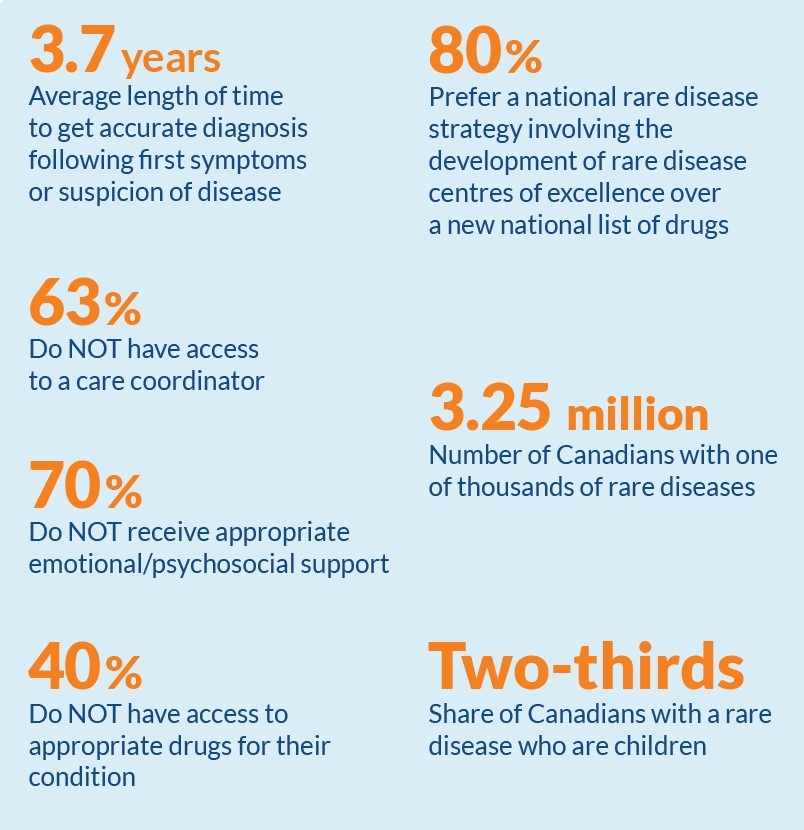Source: CTV News
by Megan Delaire
Many Canadians living with rare diseases struggle for years to receive a diagnosis or access care, according to results of a new national survey conducted by market research firm Ipsos Canada.
On behalf of the Canadian Organisation for Rare Disorders, Ipsos administered the survey to 528 Canadian patients with rare diseases and their direct caregivers between Oct. 26 and Nov. 28, 2022.
They found that significant delays and obstacles arise for Canadian patients and their families in all key areas – including long delays in diagnosis, disease and knowledge information gaps, lack of access to drugs, and lack of co-ordinated and accessible care. The results were published on Tuesday, in time for global Rare Disease Day.
“These survey results provide important guidance for Canadian policymakers in shaping Canada’s rare diseases strategy, which is so urgently needed,” Stephen Parrott, board chair of Canadian VHL Alliance, said in a media release published on Tuesday. VHL, or Von Hippel-Lindau disease, is a rare inherited disease that causes cysts and tumours which can be cancerous.
“Canadians with rare diseases and their families have waited far too long and with severe consequences that, in many cases, could be prevented.”
CHALLENGES WITH DIAGNOSIS
According to the survey, patients and caregivers felt that their health-care professionals lacked knowledge of rare diseases, which delayed diagnosis and access to specialist care.
Four out of five, or 80 per cent, responded that they do not think family physicians are aware and informed about rare diseases and 62 per cent said the same about pediatricians. Nearly half, or 47 per cent, said they do not believe specialists have up-to-date knowledge about rare diseases.
Respondents said they waited an average of 3.7 years to get an accurate diagnosis. In the process, they reported seeing an average of 5.9 different health-care professionals and received an average of 3.2 wrong diagnoses.
INFORMATION AND KNOWLEDGE GAPS
Respondents impacted by rare diseases reported often feeling “lost.” They felt a need to connect with others with rare diseases, but said they faced obstacles in doing so.
Nearly two-thirds, or 63 per cent, said they do not have access to a care co-ordinator.
The survey also revealed a widespread lack of counselling support for patients with rare diseases, with almost three out of four, or 74 per cent, saying they did not have counselling support at the time of diagnosis. Another 70 per cent said they did not receive appropriate emotional and psychosocial support.
Fewer than 58 per cent of respondents said they feel they have adequate access to all of the information they need, and only 43 per cent said they were assigned a contact person they could rely on for additional information.
Fewer than one in 10 agreed that educational, disability and employment services are adequately aware and informed about rare diseases.
ACCESS TO TREATMENTS
A large number of respondents with rare diseases said it was difficult for them to access the appropriate drug therapy for their condition.
Only six out of every 10 said they had access to appropriate drugs for their condition.
The majority of respondents, 63 per cent, said they were on the hook for out-of-pocket expenses, while 36 per cent said they couldn’t access the medicine prescribed to them because their share of the cost was too high.
 Statistics from an Ipsos survey of Canadians with rare disorders for Rare Disease Day 2023. (CNW Group/Canadian Organization for Rare Disorders/Ipsos Canada)
Statistics from an Ipsos survey of Canadians with rare disorders for Rare Disease Day 2023. (CNW Group/Canadian Organization for Rare Disorders/Ipsos Canada)
Although 68 per cent of Canadians with rare diseases are aware of drugs approved by Health Canada to treat their conditions, 43 per cent said they cannot easily access those prescribed treatments. Another 32 per cent said they are aware of off-label drugs that could “help their condition” but almost 63 per cent said they could not access them.
THE PROMISE OF RARE DISEASE CENTRES
The Ipsos survey asked respondents to vote for their favourite out of two alternative solutions proposed as key features of a federally-funded national rare disease strategy.
One solution is the development of a new national list of drugs for rare diseases. The other is the creation of rare disease centres that would specialize in rare disease treatment.
Four out of five, or 80 per cent, said they prefer the development of rare disease centres, while 20 per cent said they prefer a new national list of drugs. Among those who voted for a new national list of rare disease drugs, most said they hoped it would provide better drug coverage with lower costs, and that drugs would be more accessible to all Canadians, regardless of their location.
Among those who voted for rare disease centers, most said they hoped they would benefit from “comprehensive support, access to clinical trials” and more efficient and accessible treatment.
“Treating a patient with a rare disease goes beyond access to rare and expensive drugs,” one anonymous caregiver said, according to the survey results. “Rare disease centres would address a wide variety of gaps that exist in the diagnosis and treatment of rare diseases.”
METHODOLOGY
The Canadian Organization for Rare Disorders emailed an open link to this Ipsos-developed survey to its database. It also shared the link at the Canadian Rare Disease 2022 Fall Conference, from Nov. 21 to 22, 2022.
In total, 528 respondents completed the 15-minute online open-link survey between Oct. 26 and Nov. 28, 2022. Responses were received from every province, in both official languages, 90 per cent English and 10 per cent French. They were distributed across urban (47 per cent), suburban (34 per cent) and rural (20 per cent) locations. The data was not weighted, and credibility interval cannot be calculated when an open link is used and when the population universe is unknown.
In a second phase, 10 in-depth interviews were conducted with patients and caregivers on their experiences navigating the system.